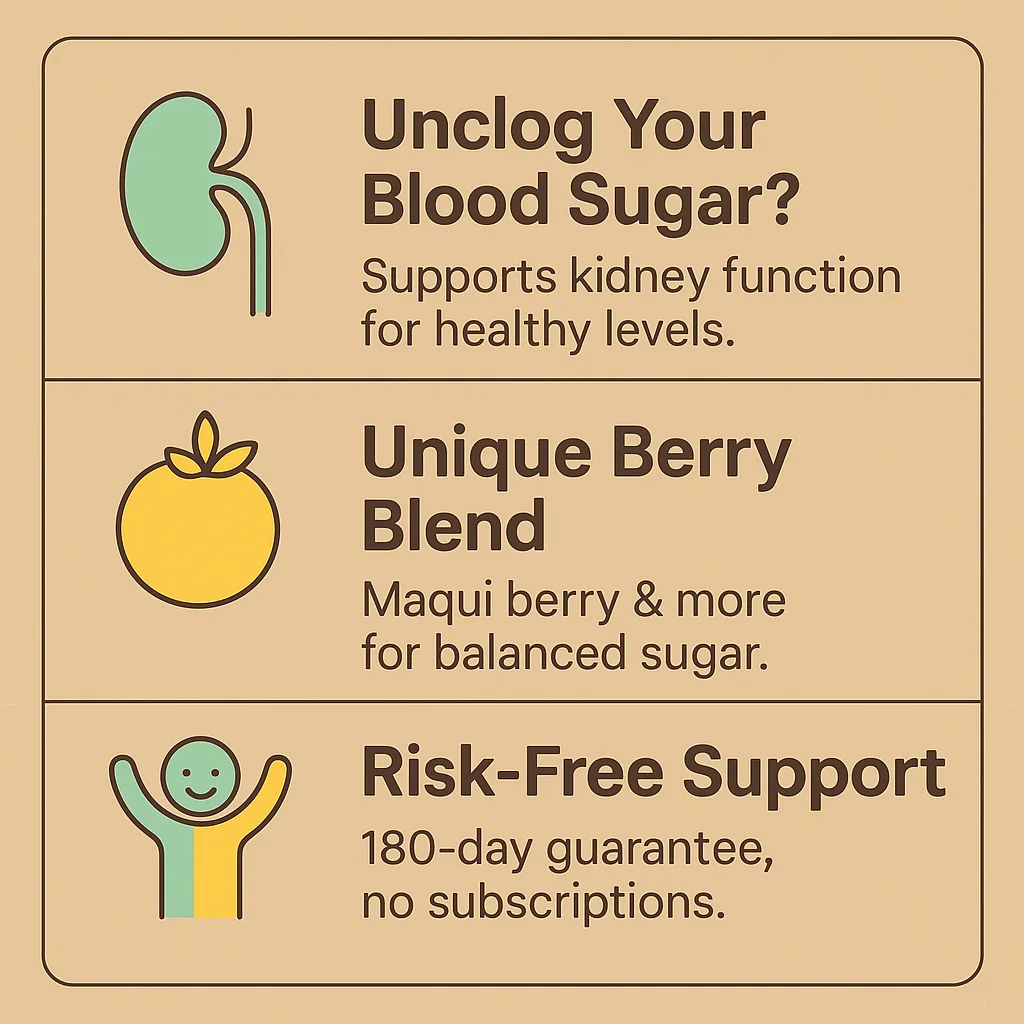Is Your Blood Sugar Drain Blocked? (And Why You Should Care)

Let’s cut to the chase: If you’re worried about blood sugar, you’ve probably heard every pitch under the sun about insulin, diet, and “metabolic magic.” But GlucoBerry? It’s playing a different game. Instead of fixating on insulin like every other supplement, it’s targeting your kidneys’ “Blood Sugar Drain” — a concept so weird it sounds like a sci-fi plumbing fix. But here’s the kicker: The science might actually have legs. Let’s unpack this.
Take the wheel – I’m buckled in!
The “Drain” Theory: Genius or Gibberish?
Picture your kidneys as a sink. Insulin carries sugar to the drain (your kidneys), but if the drain’s clogged with “sticky gray protein” (yes, that’s the technical term), sugar recycles back into your blood. GlucoBerry claims its blend of maqui berry, chromium, biotin, and gymnema leaf clears this gunk, letting your body flush excess sugar like a properly functioning sewer system.
Harvard and Johns Hopkins studies are name-dropped here, which sounds impressive until you realize the details are as vague as a politician’s promises. Still, the logic checks out: If your kidneys are clogged (and 50% of Americans supposedly are), targeting that issue could be smarter than just jamming more insulin support down your throat.
The Ingredients: Science-Backed or Snake Oil?
Let’s break down the stars of this show:
- Maqui Berry Extract: Harvested from wild Andes plants, this berry allegedly reduces post-meal sugar spikes and improves long-term markers by 23%. Cool! But the studies cited? Light on specifics. It’s like saying, “Trust us, we’ve seen some stuff.”
- Chromium & Biotin: A Yale study supposedly showed this duo boosts insulin’s taxi service to the kidneys. Chromium’s a known player in blood sugar support, but “pairing it with biotin” feels like a duet that’s been overhyped.
- Gymnema Leaf: A 58-person study mentions Hemoglobin A1C improvements. Small sample size? Absolutely. But gymnema’s been used in traditional medicine for ages, so it’s not exactly a left-field pick.
The formula’s “proprietary” nature means we’re trusting the brand’s dosages. That’s a red flag for transparency, but hey, at least they’re not throwing in fillers or sketchy additives.
The Bottom Line: Is GlucoBerry Worth Your $59?
Pros:
- Unique angle: Targets kidney function, not just insulin.
- 180-day guarantee: Risk-free trial longer than most marriages.
- No “auto-ship” traps: Buy once, no sneaky subscriptions.
Cons:
- Sparse independent reviews: 3.7/5 stars with “mixed” feedback isn’t exactly a ringing endorsement.
- Pricey for a maybe: $59/month is a splurge if you’re on a budget.
- Results take time: They admit it could take weeks or months. Patience isn’t everyone’s virtue.
Take the wheel – I’m buckled in!
The Final Verdict
GlucoBerry is like the underdog plumber who claims they can unclog your pipes without tearing up the floorboards. It’s got a clever premise, a dash of research, and a guarantee so generous it’s basically saying, “Try us or we’ll give you your money back, even if you eat all the pills.”
But here’s my honest take: If you’ve tried every blood sugar supplement and still feel stuck, this could be worth a shot — especially with the 6-month return policy. Just don’t expect miracles. It might help, it might not, but at least you’re not out a small fortune if it flops.
Still, I’d grab the single bottle first before committing to a 6-month “savings” plan. Let’s call that $59 a tuition fee for School of Hard Knocks: Blood Sugar Edition.
Full disclosure: As an affiliate, I earn from qualifying purchases. That said, I only recommend products I genuinely believe could provide value based on my research.
